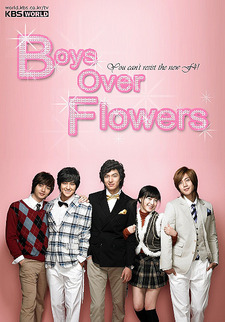
Back فتيان قبل الزهور (مسلسل) Arabic Boys Over Flowers AST Boys Before Flowers BAN Boys Over Flowers (сериал) Bulgarian Boys Over Flowers Breton Boys Over Flowers Catalan Kgospoda namdža Czech Hana Yori Dango Welsh Boys Over Flowers Danish Boys Over Flowers German
| Boys Over Flowers | |
|---|---|
 Promotional poster | |
| Also known as | Boys Before Flowers |
| Hangul | 꽃보다 남자 |
| Hanja | 꽃보다 男子 |
| Revised Romanization | Kkotboda Namja |
| McCune–Reischauer | Kkotpoda Namja |
| Genre | |
| Based on | Boys Over Flowers by Yoko Kamio |
| Written by | Yoon Ji-ryun |
| Directed by | Jeon Ki-sang |
| Starring | |
| Opening theme | "Paradise" by T-Max |
| Ending theme | |
| Composer | Oh Joon-sung (오준성) |
| Country of origin | South Korea |
| Original language | Korean |
| No. of episodes | 25 |
| Production | |
| Executive producer | Kim Hyeong-il (KBS Drama Headquarters) |
| Producer | Gwak Jeong-hwan (KBS Drama Operations Team) |
| Production locations |
|
| Production company | Group 8 |
| Original release | |
| Network | KBS2 |
| Release | January 5 – March 31, 2009 |
| Related | |
| Meteor Garden (2001, Taiwan) Hana Yori Dango (2005, Japan) Meteor Garden (2018, China) F4 Thailand: Boys Over Flowers (2021, Thailand) | |
| Infobox instructions (only shown in preview) | |
Boys Over Flowers (Korean: 꽃보다 남자; Hanja: 꽃보다 男子; RR: Kkotboda Namja; MR: Kkotpoda Namja) is a 2009 South Korean television series starring Koo Hye-sun, Lee Min-ho, Kim Hyun-joong, Kim Bum, and Kim Joon. Based on the Japanese manga series Boys Over Flowers (花より男子, Hana Yori Dango) which was written and illustrated by Yoko Kamio,[1] the series, directed by Jeon Si-Kang, tells a story of a working-class girl who gets tangled up in the lives of a group of wealthy young men in her elite high school. It aired for 25 episodes on KBS2 from January 5 to March 31, 2009.[2]
It is often regarded as a pioneer in Korean high school series, as well as to have helped the proliferation of the "Korean Wave". The series earned high viewership ratings in South Korea, and became a cultural phenomenon throughout Asia.[3][4] Lee Min-ho's role as the leader of F4 completely contrasted his role in Mackerel Run, which earned him overseas popularity.[5]
- ^ Han Sang-hee (February 10, 2009). "Boys Over Flowers Continues to Bloom in Korea". The Korea Times. Archived from the original on October 15, 2013. Retrieved February 18, 2013.
- ^ 꽃보다 남자 프로그램 정보 [Boys Over Flowers Program Information]. Korean Broadcasting System (in Korean). Retrieved March 2, 2018.[permanent dead link]
- ^ Jin, Dal Young, ed. (2010). "Hybrid Regionalism in East Asian Popular Culture, Korean Television Drama: Boys Over Flowers". Global Media Convergence and Cultural Transformation. IGI Global. pp. 84–85. ISBN 978-1609600396. Archived from the original on February 7, 2022. Retrieved October 25, 2020.
- ^ Kang, Hye-ran; Lee, Young-hee (July 8, 2009). "The next 'Korean wave' washes ashore". Korea JoongAng Daily. Archived from the original on March 3, 2018. Retrieved March 2, 2018.
- ^ "14 Years of Lee Min-Ho: From Gu Jun-Pyo to Emperor Lee Gon". Archived from the original on November 12, 2020. Retrieved November 12, 2020.